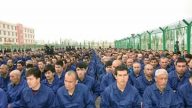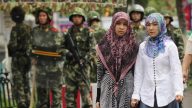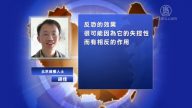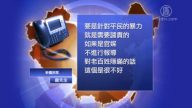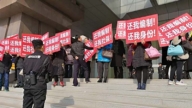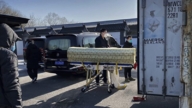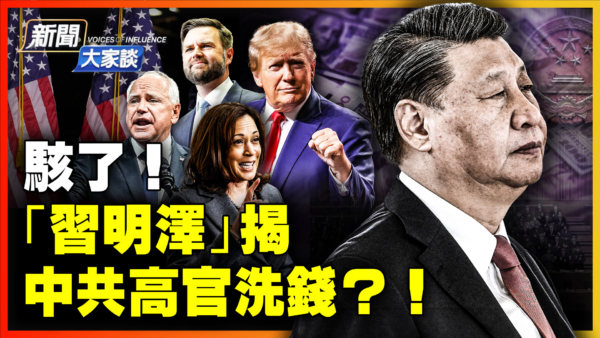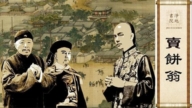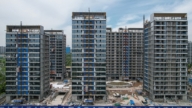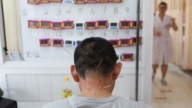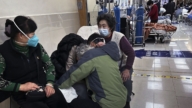【新唐人2014年11月15日訊】泰國官員在日前披露,被拘禁在泰國的100多名難民逃跑了,這些難民被認為是來自中國新疆的維吾爾族人。泰國警方是擔心,他們可能已經落入了人販子手中。此前曾有媒體披露,北京當局向泰國政府施壓,要求遣返被羈押在泰國的數百名維吾爾難民。
法新社12號報導,有大約100多名可能是中國新疆的維吾爾族難民,從泰國的難民營中逃跑。
報導說,今年3月份,泰國警方突襲該國南部宋卡省的一個人口販賣團夥時,發現了300多名偷渡者。泰國當局判定他們非法入境。
泰國警方把這些人拘留在宋卡的一個移民拘留中心,準備等確定他們的身份後再決定如何處理。這些人自稱是土耳其人,但是,在美國的維吾爾活動人士說,這些人是來自中國新疆的維吾爾人。
一名叫順潘的泰國宋卡官員對法新社表示,兩個移民中心的160名婦女兒童中,目前只剩下40人,其他人在11月1號至5號夜間逃走了。他擔心這些人落入人口走私集團手中。他說,這些人想去土耳其,不願意回到中國。
旅居泰國的時政評論員古春秋:「從大陸出來的人你也知道,他們受到中共的迫害,這種迫害應該說不是一般的迫害,對於維吾爾人可能是一種生命,他們可能真的生命受到威脅,他們才會跑出來 ,來到泰國實際上尋求一種庇護。」
古春秋說,泰國沒有簽署難民公約,包括難民署在泰國的運作都是處於灰色地帶,如果這些難民沒有和聯合國難民署聯繫上,處於驚恐當中的他們,選擇逃跑應該是求生的本能。
古春秋:「我在泰國這裡我知道,泰國政府一般可能還不會遣返,因為泰國是一個信佛的國家,他們這裡的人還是很善良,維吾爾人不一定會了解這個情況,因為他們只知道在其他的國家 ,在緬甸或者到馬來西亞,這些國家可能有過遣返的先例,他們在這一點上知道,他們會有陰影。」
英國《金融時報》在今年的4月3號時曾報導,中共當局加緊對泰國當局施壓,要求遣返從動盪的新疆逃出來、現被羈押在泰國的424名維吾爾難民。
但是,國際人權組織、美國、歐洲和聯合國都敦促泰國政府,不要遣返包括60多名兒童的這一大批移民,因為擔心他們會面臨嚴厲懲罰。
這400多名維吾爾人被羈押在泰國多個羈留中心 ,許多人為防止中共官員接觸他們 ,自稱是土耳其人。《金融時報》說,中共有關官員被允許前往曼谷一個羈留所 ,見到了被關在裏面的127名維吾爾人。而中共外交部在回答媒體的有關提問時宣稱,中泰兩國在查禁非法移民活動中,保持緊密合作。
美國維吾爾協會副主任伊利夏提•哈桑先生:「在東南亞國家,一旦維吾爾人他們承認是維吾爾人,即便是在聯合國的保護之下,也就是獲得難民的身份認可以後,仍然被所在國遣返回中國 ,而這些人都面臨非常嚴酷的審判。」
近年來,在中共當局的壓力下,包括柬埔寨、馬來西亞和巴基斯坦在內的很多國家,都曾強行把逃到該國尋求庇護的維吾爾人,遣送回中國。這些人被遣返後,有的被判重刑,有的被失蹤。
美國維吾爾協會副主任伊利夏提•哈桑先生:「像柬埔寨2009年底遣返的20個維吾爾人,最長的是無期徒刑,所以任何一個維吾爾人在東南亞這些國家,只要不到西方國家,沒有人敢承認自己是維吾爾人,因為一旦承認是維吾爾人,往往所在國以及聯合國都無能為力去保護他們。 」
2009年底,柬埔寨政府以「非法入境」為由,將20名尋求政治庇護的維吾爾人遣返回中國;2011年,馬來西亞當局將11名維族人遣返回中國;2012年,馬來西亞政府又將6名維吾爾人遣返回中國 。這些事件引起美國、聯合國以及世界各地的維吾爾族組織的強烈不滿。
美國最新發佈的人權報告指責中共在新疆實施鎮壓。美國的維吾爾人權組織呼籲國際社會,援助為逃避中共當局的「高壓嚴打」而逃到泰國等東南亞國家的維吾爾人,並要求北京允許這些維吾爾難民前往願意接收他們的國家。
採訪編輯/ 李韻 後製/肖顏
Hundreds of Thai Uyghur Migrants Flee from Repatriation
Thai official disclosed that more than 100 migrants thought
to be from China’s Uyghur minority have escaped
from shelters in Thailand.
The authorities feared they have fallen into the hands
of a human trafficking ring.
Under pressure from Beijing, media have reported that
Thailand was requested to return these Uyghurs to China.
AFP reported on Nov. 13 that, “more than 100 migrants
thought to be from China’s Uyghur minority have escaped
from shelters in Thailand."
“Thailand has held dozens of the migrants since March,
when they were discovered during a raid on a suspected
people-smuggling camp in the kingdom’s deep south
and sentenced for illegal entry," said the report.
“Songkhla province police had said they were waiting
to identify the nationalities of the group before deciding
their fate.
The migrants claimed they were Turkish, but US-based
Uyghur activists identified them as Uyghurs from China’s
northwestern Xinjiang region."
“‘Only 40 of around 160 women and children
remain at the two shelters.
They ran away together at night between
November 1 and 5,’ Jaras Chumpan, chief of the social
development and human security office in southern
Songkhla province," told AFP.
“They want to go to Turkey — they do not want
to go back to China."
Gu Chunqiu, commentator in Thailand: “We know those
who fled from China have been persecuted
by the Chinese Communist Party.
The persecution of the Uyghurs
is a matter of life and death.
Their lives are threatened.
They took refuge by coming to Thailand."
Gu Chunqiu explains that Thailand has not signed
the Refugee Convention, even the UNHCR operation
in Thailand is a gray area.
Without the contact of the UNHCR,
it is their instinct in a panic to survive by running away.
Gu Chunqiu: “I live here, I know.
The Thai government generally may not repatriate
them back to China.
Thailand is a Buddhist country, people are very kind.
But, the Uyghurs would not necessarily understand
the situation.
They only knew that there are cases in other countries
such as Burma or Malaysia where the refugees were
repatriated. It was a shadow to them."
Financial Times reported that on Apr. 3, “China has stepped
up pressure on Thai authorities to repatriate 424 Uighur
refugees who have been detained as illegal immigrants
in Thailand after fleeing the increasingly restive Chinese
territory of Xinjiang.
But human rights groups, the US, Europe and the UN
are urging the Thai government not to send the large group
of migrants, including more than 60 children, back to China
for fear they will face severe punishment," said FT.
“Many of the 424 Uighurs being held in Thailand have
claimed to be Turkish in order to deny Chinese officials
access to them."
FT reported that, “the Chinese government has been granted
access to 127 of the Uighurs who are being held in Bangkok.
In answer to questions about the case, China’s foreign
ministry would only say that “China and Thailand have
maintained close co-operation in combating
illegal immigration activities."
Ilshat Hassan, deputy director of the Uyghur American
Association: “In Southeast Asian countries, once they admit
that they are the Uyghurs, even under the protection
of the UN, that is, after obtaining refugee status recognition,
they are still repatriated to China, where they are faced
with very harsh punishment."
Accordingly, “under pressure from Beijing, countries
including Cambodia, Malaysia and Pakistan have all
in recent years forcibly returned Uyghurs to China.
Some of them have been executed or sentenced to hefty jail
terms while others have simply disappeared."
Ilshat Hassan: “Like the 20 Uyghurs repatriated by Cambodia
at the end of 2009, there was life imprisonment.
Any Uyghur in the Southeast Asian countries would not dare
to admit that they are the Uyghurs.
As long as they are not in the Western countries, once they
admit that they are Uyghurs, often the host country
and the United Nations are powerless to protect them."
In the end of 2009, the Cambodian government sent
20 Uyghurs back to China on grounds of “illegal immigration."
In 2011, the Malaysian authorities sent 11 Uyghurs back
to China; In 2012, Malaysia again sent 6 Uyghurs back
to China.
These incidents aroused strong dissatisfaction
from the United States, the United Nations,
and the Uyghur organizations from around the world.
“The latest annual US human rights report said that China
carries out “severe official repression" of Uyghur sin Xinjiang,"
according to AFP.
The Uyghur American Association urged the international
community to offer shelters to refugees,
and allow the refugees access to countries
which are willing to accept them.
Interview & Edit/liyun Post-Production/xiaoyan


